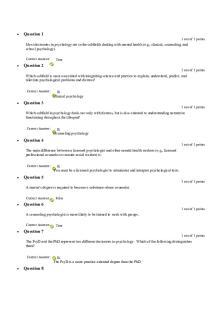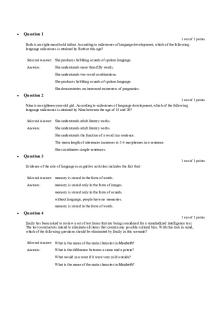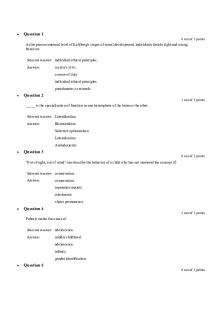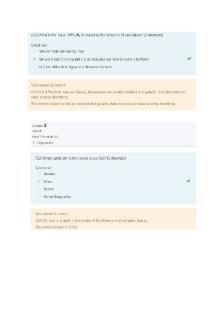Psc 124 quiz #5 - weekly quizesss PDF

| Title | Psc 124 quiz #5 - weekly quizesss |
|---|---|
| Course | International Relations |
| Institution | Syracuse University |
| Pages | 6 |
| File Size | 125.7 KB |
| File Type | |
| Total Downloads | 41 |
| Total Views | 149 |
Summary
weekly quizesss...
Description
Quiz #5 – Terms: Chapters 8 and 9 Chapter 8 International political economy: the politics of international economic activities, trade, monetary relations and multi-national corporations Mercantilism: generally shares with realism the belief that each state must protect its own interests at the expense of others, not relying on international organizations Economic liberalism: shares a belief with liberal internationalism that in the possibility of cooperation to realize common gains, it holds that by building international organizations, institutions and norms, states can mutually benefit from economic exchanges Marxism: a branch of socialism that emphasizes exploitation and class struggle and includes both communism and other approaches Balance of trade: the value of a state’s exports relative to its imports Comparative advantage: different states enjoy in producing different goods, in order to maximize the overall creation od wealth each state would specialize in producing the goods for which it has comparative advantage and then trade for goods that another state produces best Adam Smith and David Ricardo: pioneered the comparative advantage concept about 200 years ago Monopoly: when there is just one supplier of an item, the supplier can set the price wherever they want, which is usually high Oligopoly: is a monopoly shared by just a few large sellers, often allowing for tacit or explicit coordination to force the price up of an good Corruption: is another means of influence over host govts that cannot be overlooked, nobody knows the full extent to which MNCs use payoffs, kickbacks and gifts and similar methods to win the approval of individual govt officials for policies favorable to the MNC Sanctions: Autarky: a way to avoid becoming dependent on other states, and to avoid trading at all, it is instead when the state tries to produce everything it needs by itself Protectionism: protection of domestic industries from international competition
Dumping: a predatory practice Tariff: a duty or tax levied on certain types of imports usually as a percentage of their value as they enter a country Nontariff barriers: other means to discourage imports Quotas: ceilings on how many goods of a certain kind can be imported, they are imposed to restrict the growth of such imports Subsidies: are payments by a government to a domestic industry that allow it to lower its prices without losing money WTO: World Trade Organization, is a global multilateral IGO that promotes monitors and adjudicates international trade, the WTO shapes the overall expectations and practices of states regarding international trade GATT: General Agreement on Tariffs and Trade, created in 1974 to facilitate freer trade on a multilateral basis, was more of a negotiating framework than an administrative institution MFN: most-favored nation, which says that trade restrictions imposed by a WTO member on its most-favored trading partner must be applies equally to all WTO members GSP: Generalized System of Preferences, the states give trade concessions to poor ones to help their economic development Uruguay Round: 1986, 123 countries, brought about the biggest reform of the world’s trading system, created an agenda that covered virtually every outstanding trade policy issue, Doha Round: in 2001 trade ministers meeting in Doha, Qatar agreed to launch a new round of trade negotiations, issues discussed included agriculture, services industrial products, and intellectual property Free trade areas: in such areas groups of neighboring states agree to remove most or all trade barriers within their area NAFTA: North American Free Trade Agreement, a free trade zone encompassing the United States, Canada and Mexico since 1994 FTAA: Free Trade Area of the Americas, politicians in North and South America have long spoken of creating a single free trade area in the Western Hemisphere, from Alaska to Argentina, but with numerous international events taking place which have limited trade in some areas this hasn’t officially been put in place yet Cartel: an association of producers or consumers of a certain product, formed for the purpose of manipulating its price on the world market
OPEC: Organizational of Petroleum Exporting Countries, the most prominent cartel in the international economy; its members control about half the world’s total oil exports, enough to significantly affect the world price of oil Industrial policy: the strategies by which a govt works actively with industries 5 important industries in trade negotiations: Intellectual property: the legal protection of the original works on inventors, authors, creators and performers under patent, copyright and trademark law, such rights became a contentious area of trade negotiations in the 1990s WIPO: World Intellectual Property Organization, an exstensive IGO with 184 members, which tries to regularize patent and copyright law across borders, WIPO rules require only a majority vote to change TRIPS: Trade-Related aspects of Intellectual Property Rights, the WTO that oversees the worlds most important multilateral agreement on intellectual property, most industrialized countries prefer to use TRIPS rules b/c these rules are stronger than WIPO safeguards and can be relaxed only if all WTO members agree Smoot-Hawley Act: it was a protectionist act and was adopted in the US in 1930, it imposed tarrifs on imports, contributed to the severity of the depression by provoking retaliation and reducing world trade Centrally planned economy: an economy in which political authorities set prices and decide on quotas for production and consumption of each commodity according to a long-term plan Transitional economy: countries in Russia and Eastern Europe that are trying to convert from communism to capitalism with various degrees of success Mixed economy: economies such as those in the industrial West that contain both some govt control and some private ownership From lecture: Race to the bottom Chapter 9 Gold standard: a system in international monetary relations, prominent for a century before the 1970s, in which the value of national currencies was pegged to the value of gold or other precious medals
Exchange rate: the rate at which one state’s currency can be exchanged for the currency of another state, since 1973 the international monetary system has depended mainly on floating rather than fixed exchange rates Convertible currencies: the guarantee that the holder of a particular currency can exchange it for another currency, some states’ currencies are nonconvertible Hyperinflation: an extremely rapid, uncontrolled rise in prices, such as occurred to Germany in the 1920s and some third world countries more recently Hard currency: money that can be readily converted to leading world currencies Fixed exchange rates: the official rates of exchange for currencies set by govts not a dominant mechanism in the international monetary system since 1973 Floating exchange rates: the official rates of exchange for currencies set by govts not a dominant mechanism in the international monetary system since 1973 Managed float system: a system of occasional multinational govt interventions in currency markets to manage otherwise free floating currency rates Supply and demand (of currencies): the value of a state’s currency tends to rise or fall relative to others b/c of changes in the long-term supple and demand for the currency, supply is determined by the amount of money a govt prints, demand for currency depends on the state’s economic health and political stability Devaluation of currency: a unilateral move to reduce the value of a currency by changing a fixed or official exchange rate Central bank: an institution common in unindustrialized countries whose major tasks are to maintain the value of the state’s currency and to control inflation The Fed: Discount rate: the interest rate changed by govts when they lend money to private banks, the discount rate is set by countries’ central banks Bretton Woods system
World Bank: formally the International Bank for Reconstruction and Development an organization that was established in 1944 as a source of loans to help reconstruct the European economies, later the main borrowers were third world countries and in the 1990s Eastern European ones International Monetary Fund: an intergovernmental organization IGO that coordinates international currency exchange the balance of international payments and national accounts SDR: Special Drawing Right, a world currency created by the international monetary fund to replace gold as a world standard, valued by a basket of national currencies the SDR has been called paper gold Balance of payments: a summary of all the flows of money into and out of a country, it includes three types of international transactions: the current account including the merchandise trade balance, flows of capital and changes in reserves Current account: money in to pay for exports, flows out to pay for imports, govt transactions Capital flows: foreign investments in and by a country, they are measured in net terms, the total investments and loans foreigners make in a country minus the investments and loans that country’s companies citizens and govt invest in other countries, they are divided into foreign direct investment and indirect portfolio investment Standing wealth: Keynesian economics: the US adopted this principle by using deficit spending to stimulate the economy by paying itself back from new wealth generated by economic recovery Deficit spending: govts spend more on programs than they take in from tax revenue in order to stimulate economic growth Fiscal policy: a govts decisions about spending and taxation, and on of the two major tools of macroeconomic policy making the other being monetary policy Monetary policy: a govts decisions about printing and circulating money, and one of the two major tools of macroeconomic policy making, the other being fiscal policy National debt: the amount a govt owes in debt as a result of deficit spending 1997 Asian financial crisis:
MNCs: a company based in one state with affiliated branches or subsidiaries operating I other states Foreign direct investment: the acquisition by residents of one country of control over a new or existing business in another country, also called direct foreign investment Host country: a state in which a foreign MNC operates, conflicts b/w the host govt and the MNC may spill over to become an interstate conflict b/w the host govt and home govt Home country: the state where the MNC has its headquarters...
Similar Free PDFs

Quiz 5 - Weekly Quiz
- 6 Pages

Titas Weekly Quiz 5
- 2 Pages

Weekly Quiz 5 Solutions
- 2 Pages

QUIZ 2 - Weekly Quiz
- 2 Pages

Quiz 8 - Weekly Quiz
- 6 Pages

Quiz 3 - Weekly Quiz
- 6 Pages

Quiz 10 - Weekly Quiz
- 6 Pages

Quiz 2 - Weekly Quiz
- 6 Pages

Quiz 9 - Weekly Quiz
- 6 Pages

Chapter 12 Quiz - Weekly Quiz
- 3 Pages

PSC Chapter 4 quiz F1016
- 2 Pages

AP quiz+answers - Weekly quiz
- 1 Pages

Chapter 8 Quiz - Weekly Quiz
- 3 Pages

Weekly Quiz 1 Solutions
- 3 Pages
Popular Institutions
- Tinajero National High School - Annex
- Politeknik Caltex Riau
- Yokohama City University
- SGT University
- University of Al-Qadisiyah
- Divine Word College of Vigan
- Techniek College Rotterdam
- Universidade de Santiago
- Universiti Teknologi MARA Cawangan Johor Kampus Pasir Gudang
- Poltekkes Kemenkes Yogyakarta
- Baguio City National High School
- Colegio san marcos
- preparatoria uno
- Centro de Bachillerato Tecnológico Industrial y de Servicios No. 107
- Dalian Maritime University
- Quang Trung Secondary School
- Colegio Tecnológico en Informática
- Corporación Regional de Educación Superior
- Grupo CEDVA
- Dar Al Uloom University
- Centro de Estudios Preuniversitarios de la Universidad Nacional de Ingeniería
- 上智大学
- Aakash International School, Nuna Majara
- San Felipe Neri Catholic School
- Kang Chiao International School - New Taipei City
- Misamis Occidental National High School
- Institución Educativa Escuela Normal Juan Ladrilleros
- Kolehiyo ng Pantukan
- Batanes State College
- Instituto Continental
- Sekolah Menengah Kejuruan Kesehatan Kaltara (Tarakan)
- Colegio de La Inmaculada Concepcion - Cebu

